Education and Training: Theories, Principles, and Models
VerifiedAdded on 2023/01/12
|13
|4185
|74
Report
AI Summary
This report, written from the perspective of an FE college in London, delves into the core theories, principles, and models of education and training. It explores procedural vs. declarative knowledge, MacWhinney’s Emergentist model, and Vygotsky’s social development theory, alongside principles like inductive and deductive reasoning. The report analyzes how these concepts are applied in teaching, learning, and assessment, considering the impact of personality theories and the VAK/scaffolding models. It also examines models of learning preferences, such as activist, pragmatist, reflector, and theorist, and how understanding these preferences enables inclusive learning and effective teaching strategies. Furthermore, the report discusses theories and models of assessment, including formative and summative assessment, and concludes with an overview of reflection and evaluation methods for improving teaching practices. The report emphasizes the importance of adapting teaching methods to accommodate diverse learning styles and preferences to create an effective learning environment.
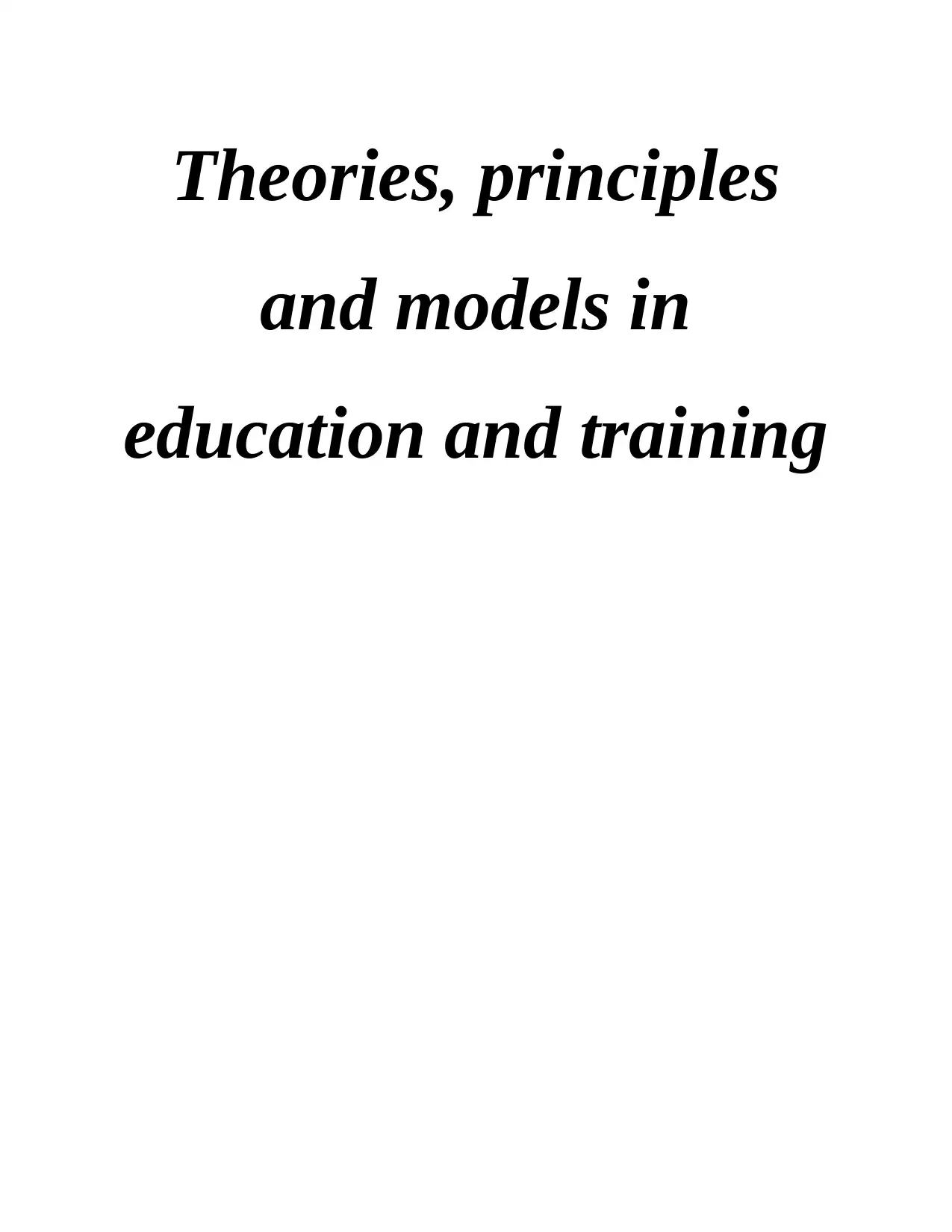
Theories, principles
and models in
education and training
and models in
education and training
Paraphrase This Document
Need a fresh take? Get an instant paraphrase of this document with our AI Paraphraser
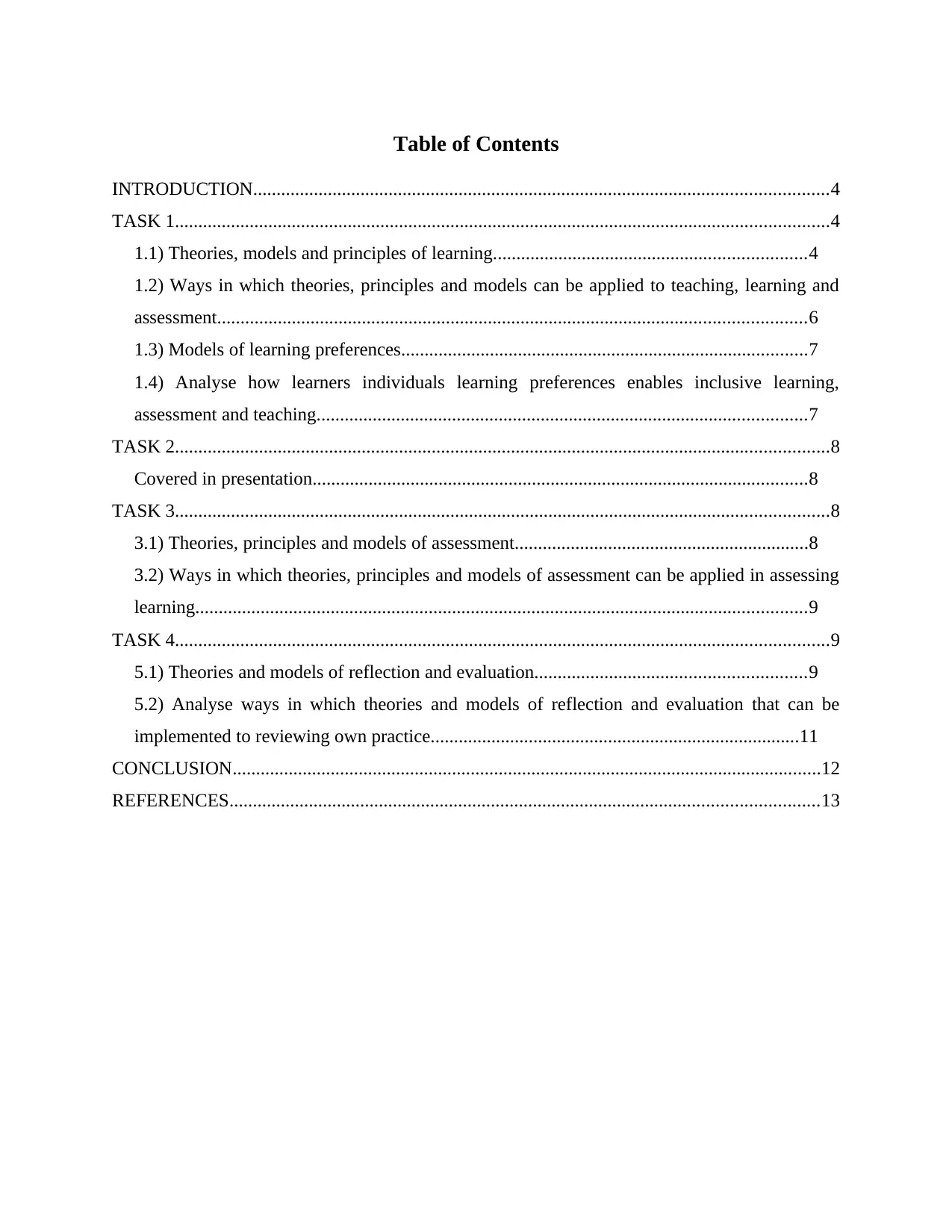
Table of Contents
INTRODUCTION...........................................................................................................................4
TASK 1............................................................................................................................................4
1.1) Theories, models and principles of learning...................................................................4
1.2) Ways in which theories, principles and models can be applied to teaching, learning and
assessment..............................................................................................................................6
1.3) Models of learning preferences.......................................................................................7
1.4) Analyse how learners individuals learning preferences enables inclusive learning,
assessment and teaching.........................................................................................................7
TASK 2............................................................................................................................................8
Covered in presentation..........................................................................................................8
TASK 3............................................................................................................................................8
3.1) Theories, principles and models of assessment...............................................................8
3.2) Ways in which theories, principles and models of assessment can be applied in assessing
learning...................................................................................................................................9
TASK 4............................................................................................................................................9
5.1) Theories and models of reflection and evaluation..........................................................9
5.2) Analyse ways in which theories and models of reflection and evaluation that can be
implemented to reviewing own practice...............................................................................11
CONCLUSION..............................................................................................................................12
REFERENCES..............................................................................................................................13
INTRODUCTION...........................................................................................................................4
TASK 1............................................................................................................................................4
1.1) Theories, models and principles of learning...................................................................4
1.2) Ways in which theories, principles and models can be applied to teaching, learning and
assessment..............................................................................................................................6
1.3) Models of learning preferences.......................................................................................7
1.4) Analyse how learners individuals learning preferences enables inclusive learning,
assessment and teaching.........................................................................................................7
TASK 2............................................................................................................................................8
Covered in presentation..........................................................................................................8
TASK 3............................................................................................................................................8
3.1) Theories, principles and models of assessment...............................................................8
3.2) Ways in which theories, principles and models of assessment can be applied in assessing
learning...................................................................................................................................9
TASK 4............................................................................................................................................9
5.1) Theories and models of reflection and evaluation..........................................................9
5.2) Analyse ways in which theories and models of reflection and evaluation that can be
implemented to reviewing own practice...............................................................................11
CONCLUSION..............................................................................................................................12
REFERENCES..............................................................................................................................13
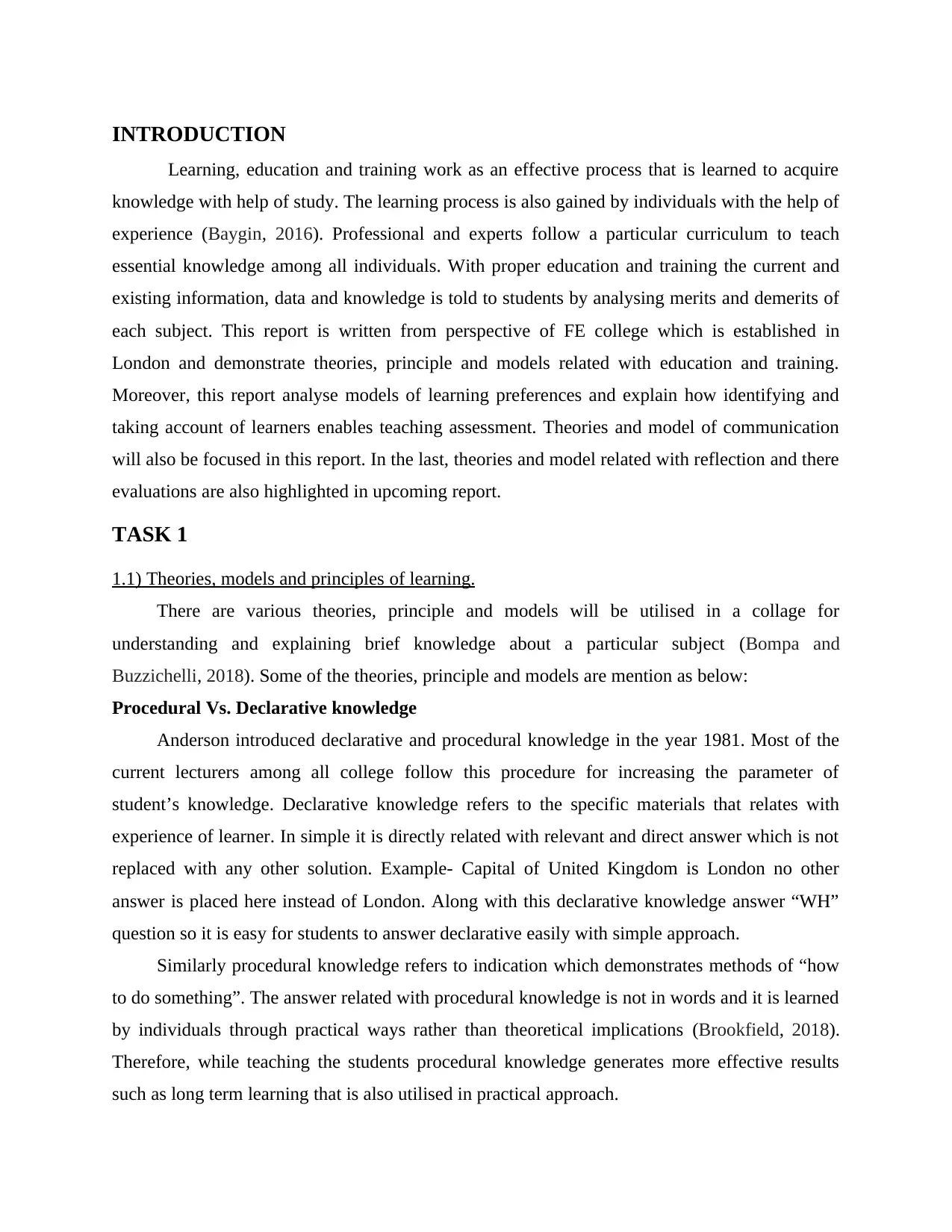
INTRODUCTION
Learning, education and training work as an effective process that is learned to acquire
knowledge with help of study. The learning process is also gained by individuals with the help of
experience (Baygin, 2016). Professional and experts follow a particular curriculum to teach
essential knowledge among all individuals. With proper education and training the current and
existing information, data and knowledge is told to students by analysing merits and demerits of
each subject. This report is written from perspective of FE college which is established in
London and demonstrate theories, principle and models related with education and training.
Moreover, this report analyse models of learning preferences and explain how identifying and
taking account of learners enables teaching assessment. Theories and model of communication
will also be focused in this report. In the last, theories and model related with reflection and there
evaluations are also highlighted in upcoming report.
TASK 1
1.1) Theories, models and principles of learning.
There are various theories, principle and models will be utilised in a collage for
understanding and explaining brief knowledge about a particular subject (Bompa and
Buzzichelli, 2018). Some of the theories, principle and models are mention as below:
Procedural Vs. Declarative knowledge
Anderson introduced declarative and procedural knowledge in the year 1981. Most of the
current lecturers among all college follow this procedure for increasing the parameter of
student’s knowledge. Declarative knowledge refers to the specific materials that relates with
experience of learner. In simple it is directly related with relevant and direct answer which is not
replaced with any other solution. Example- Capital of United Kingdom is London no other
answer is placed here instead of London. Along with this declarative knowledge answer “WH”
question so it is easy for students to answer declarative easily with simple approach.
Similarly procedural knowledge refers to indication which demonstrates methods of “how
to do something”. The answer related with procedural knowledge is not in words and it is learned
by individuals through practical ways rather than theoretical implications (Brookfield, 2018).
Therefore, while teaching the students procedural knowledge generates more effective results
such as long term learning that is also utilised in practical approach.
Learning, education and training work as an effective process that is learned to acquire
knowledge with help of study. The learning process is also gained by individuals with the help of
experience (Baygin, 2016). Professional and experts follow a particular curriculum to teach
essential knowledge among all individuals. With proper education and training the current and
existing information, data and knowledge is told to students by analysing merits and demerits of
each subject. This report is written from perspective of FE college which is established in
London and demonstrate theories, principle and models related with education and training.
Moreover, this report analyse models of learning preferences and explain how identifying and
taking account of learners enables teaching assessment. Theories and model of communication
will also be focused in this report. In the last, theories and model related with reflection and there
evaluations are also highlighted in upcoming report.
TASK 1
1.1) Theories, models and principles of learning.
There are various theories, principle and models will be utilised in a collage for
understanding and explaining brief knowledge about a particular subject (Bompa and
Buzzichelli, 2018). Some of the theories, principle and models are mention as below:
Procedural Vs. Declarative knowledge
Anderson introduced declarative and procedural knowledge in the year 1981. Most of the
current lecturers among all college follow this procedure for increasing the parameter of
student’s knowledge. Declarative knowledge refers to the specific materials that relates with
experience of learner. In simple it is directly related with relevant and direct answer which is not
replaced with any other solution. Example- Capital of United Kingdom is London no other
answer is placed here instead of London. Along with this declarative knowledge answer “WH”
question so it is easy for students to answer declarative easily with simple approach.
Similarly procedural knowledge refers to indication which demonstrates methods of “how
to do something”. The answer related with procedural knowledge is not in words and it is learned
by individuals through practical ways rather than theoretical implications (Brookfield, 2018).
Therefore, while teaching the students procedural knowledge generates more effective results
such as long term learning that is also utilised in practical approach.
⊘ This is a preview!⊘
Do you want full access?
Subscribe today to unlock all pages.

Trusted by 1+ million students worldwide
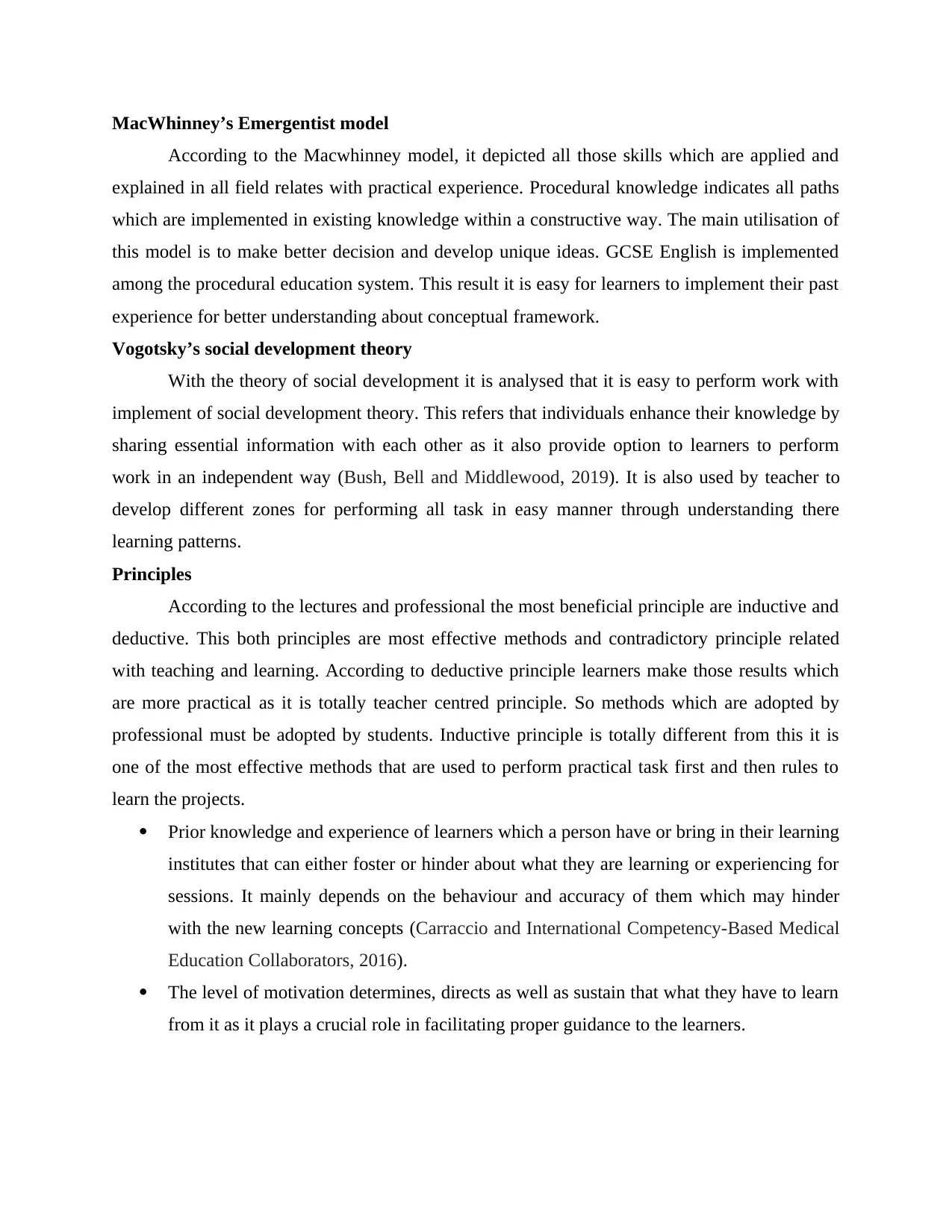
MacWhinney’s Emergentist model
According to the Macwhinney model, it depicted all those skills which are applied and
explained in all field relates with practical experience. Procedural knowledge indicates all paths
which are implemented in existing knowledge within a constructive way. The main utilisation of
this model is to make better decision and develop unique ideas. GCSE English is implemented
among the procedural education system. This result it is easy for learners to implement their past
experience for better understanding about conceptual framework.
Vogotsky’s social development theory
With the theory of social development it is analysed that it is easy to perform work with
implement of social development theory. This refers that individuals enhance their knowledge by
sharing essential information with each other as it also provide option to learners to perform
work in an independent way (Bush, Bell and Middlewood, 2019). It is also used by teacher to
develop different zones for performing all task in easy manner through understanding there
learning patterns.
Principles
According to the lectures and professional the most beneficial principle are inductive and
deductive. This both principles are most effective methods and contradictory principle related
with teaching and learning. According to deductive principle learners make those results which
are more practical as it is totally teacher centred principle. So methods which are adopted by
professional must be adopted by students. Inductive principle is totally different from this it is
one of the most effective methods that are used to perform practical task first and then rules to
learn the projects.
Prior knowledge and experience of learners which a person have or bring in their learning
institutes that can either foster or hinder about what they are learning or experiencing for
sessions. It mainly depends on the behaviour and accuracy of them which may hinder
with the new learning concepts (Carraccio and International Competency-Based Medical
Education Collaborators, 2016).
The level of motivation determines, directs as well as sustain that what they have to learn
from it as it plays a crucial role in facilitating proper guidance to the learners.
According to the Macwhinney model, it depicted all those skills which are applied and
explained in all field relates with practical experience. Procedural knowledge indicates all paths
which are implemented in existing knowledge within a constructive way. The main utilisation of
this model is to make better decision and develop unique ideas. GCSE English is implemented
among the procedural education system. This result it is easy for learners to implement their past
experience for better understanding about conceptual framework.
Vogotsky’s social development theory
With the theory of social development it is analysed that it is easy to perform work with
implement of social development theory. This refers that individuals enhance their knowledge by
sharing essential information with each other as it also provide option to learners to perform
work in an independent way (Bush, Bell and Middlewood, 2019). It is also used by teacher to
develop different zones for performing all task in easy manner through understanding there
learning patterns.
Principles
According to the lectures and professional the most beneficial principle are inductive and
deductive. This both principles are most effective methods and contradictory principle related
with teaching and learning. According to deductive principle learners make those results which
are more practical as it is totally teacher centred principle. So methods which are adopted by
professional must be adopted by students. Inductive principle is totally different from this it is
one of the most effective methods that are used to perform practical task first and then rules to
learn the projects.
Prior knowledge and experience of learners which a person have or bring in their learning
institutes that can either foster or hinder about what they are learning or experiencing for
sessions. It mainly depends on the behaviour and accuracy of them which may hinder
with the new learning concepts (Carraccio and International Competency-Based Medical
Education Collaborators, 2016).
The level of motivation determines, directs as well as sustain that what they have to learn
from it as it plays a crucial role in facilitating proper guidance to the learners.
Paraphrase This Document
Need a fresh take? Get an instant paraphrase of this document with our AI Paraphraser
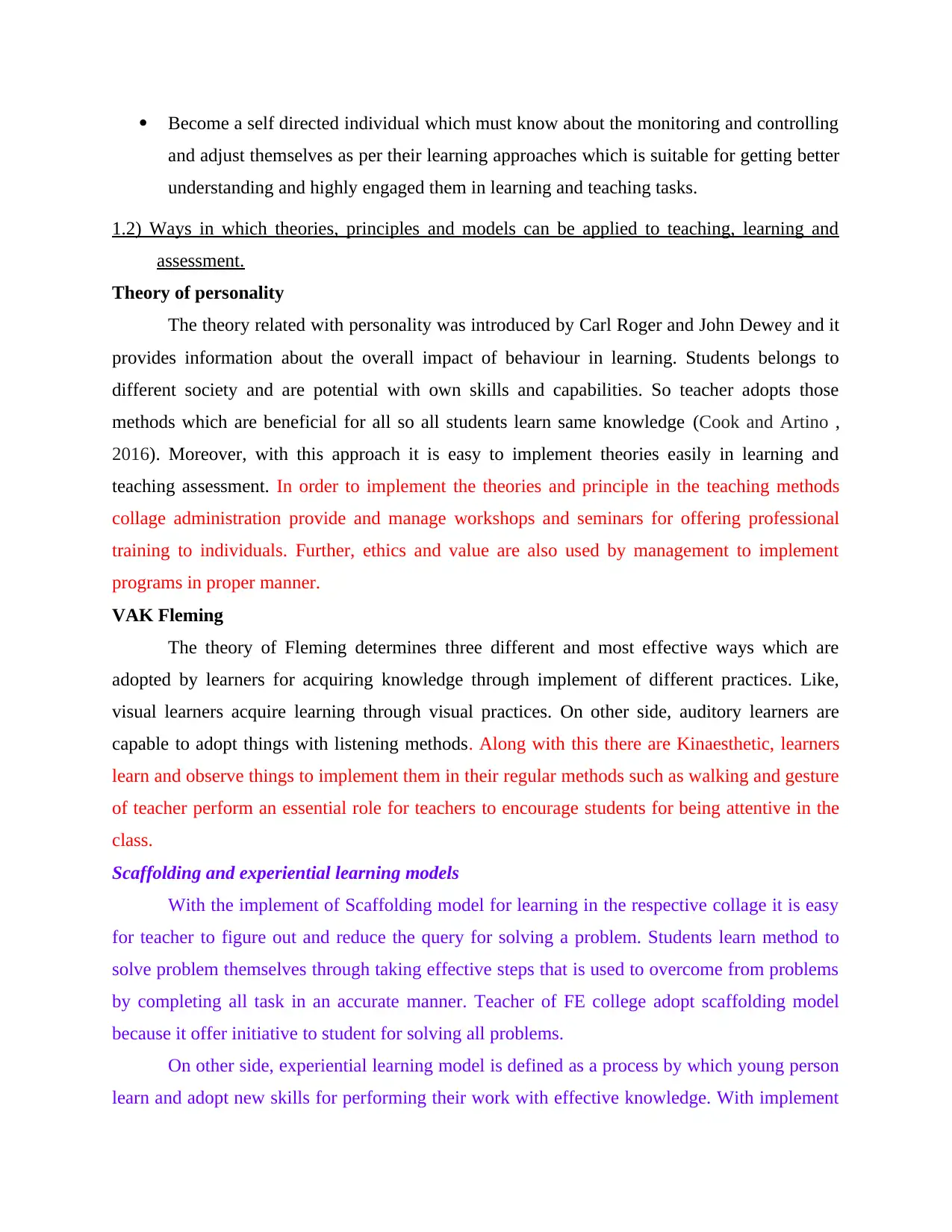
Become a self directed individual which must know about the monitoring and controlling
and adjust themselves as per their learning approaches which is suitable for getting better
understanding and highly engaged them in learning and teaching tasks.
1.2) Ways in which theories, principles and models can be applied to teaching, learning and
assessment.
Theory of personality
The theory related with personality was introduced by Carl Roger and John Dewey and it
provides information about the overall impact of behaviour in learning. Students belongs to
different society and are potential with own skills and capabilities. So teacher adopts those
methods which are beneficial for all so all students learn same knowledge (Cook and Artino ,
2016). Moreover, with this approach it is easy to implement theories easily in learning and
teaching assessment. In order to implement the theories and principle in the teaching methods
collage administration provide and manage workshops and seminars for offering professional
training to individuals. Further, ethics and value are also used by management to implement
programs in proper manner.
VAK Fleming
The theory of Fleming determines three different and most effective ways which are
adopted by learners for acquiring knowledge through implement of different practices. Like,
visual learners acquire learning through visual practices. On other side, auditory learners are
capable to adopt things with listening methods. Along with this there are Kinaesthetic, learners
learn and observe things to implement them in their regular methods such as walking and gesture
of teacher perform an essential role for teachers to encourage students for being attentive in the
class.
Scaffolding and experiential learning models
With the implement of Scaffolding model for learning in the respective collage it is easy
for teacher to figure out and reduce the query for solving a problem. Students learn method to
solve problem themselves through taking effective steps that is used to overcome from problems
by completing all task in an accurate manner. Teacher of FE college adopt scaffolding model
because it offer initiative to student for solving all problems.
On other side, experiential learning model is defined as a process by which young person
learn and adopt new skills for performing their work with effective knowledge. With implement
and adjust themselves as per their learning approaches which is suitable for getting better
understanding and highly engaged them in learning and teaching tasks.
1.2) Ways in which theories, principles and models can be applied to teaching, learning and
assessment.
Theory of personality
The theory related with personality was introduced by Carl Roger and John Dewey and it
provides information about the overall impact of behaviour in learning. Students belongs to
different society and are potential with own skills and capabilities. So teacher adopts those
methods which are beneficial for all so all students learn same knowledge (Cook and Artino ,
2016). Moreover, with this approach it is easy to implement theories easily in learning and
teaching assessment. In order to implement the theories and principle in the teaching methods
collage administration provide and manage workshops and seminars for offering professional
training to individuals. Further, ethics and value are also used by management to implement
programs in proper manner.
VAK Fleming
The theory of Fleming determines three different and most effective ways which are
adopted by learners for acquiring knowledge through implement of different practices. Like,
visual learners acquire learning through visual practices. On other side, auditory learners are
capable to adopt things with listening methods. Along with this there are Kinaesthetic, learners
learn and observe things to implement them in their regular methods such as walking and gesture
of teacher perform an essential role for teachers to encourage students for being attentive in the
class.
Scaffolding and experiential learning models
With the implement of Scaffolding model for learning in the respective collage it is easy
for teacher to figure out and reduce the query for solving a problem. Students learn method to
solve problem themselves through taking effective steps that is used to overcome from problems
by completing all task in an accurate manner. Teacher of FE college adopt scaffolding model
because it offer initiative to student for solving all problems.
On other side, experiential learning model is defined as a process by which young person
learn and adopt new skills for performing their work with effective knowledge. With implement
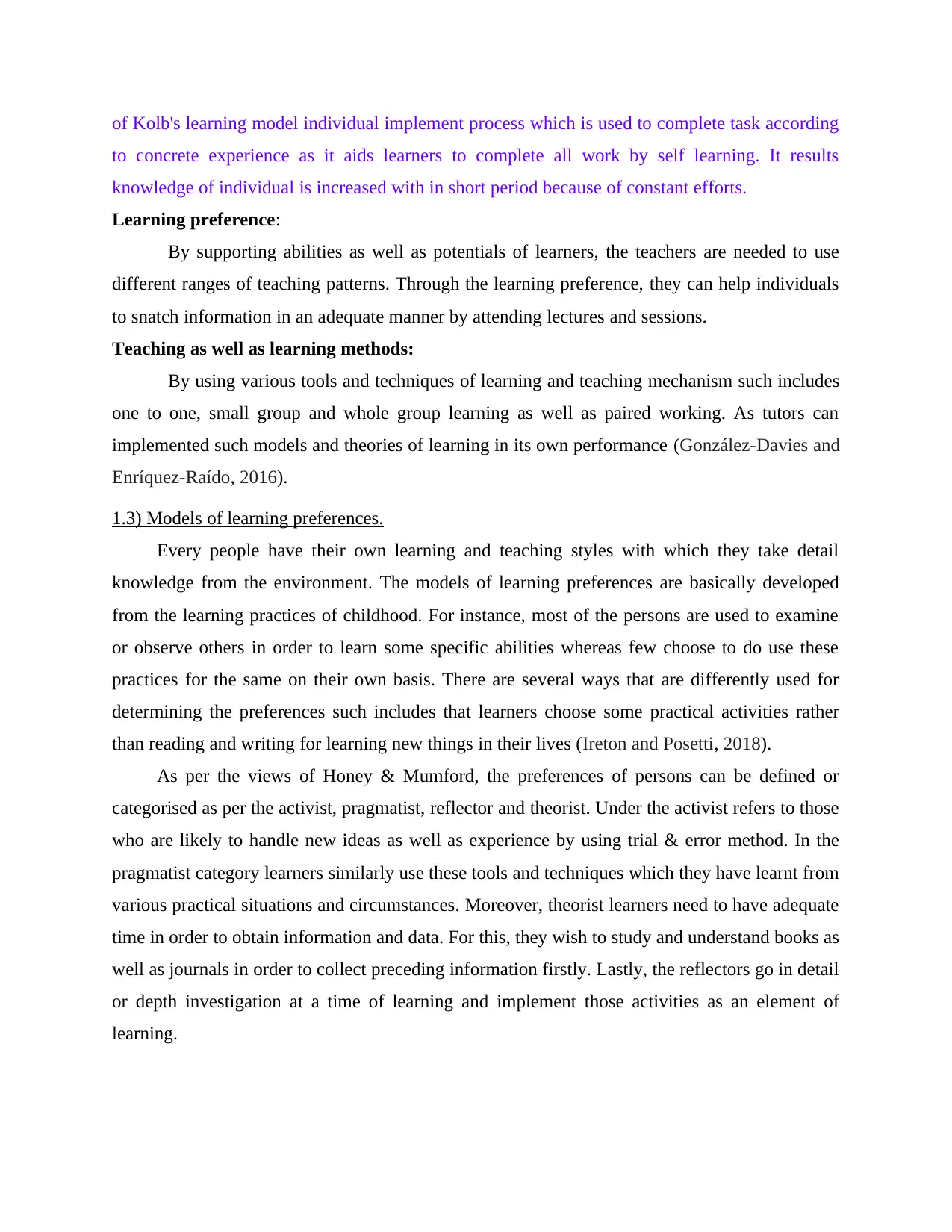
of Kolb's learning model individual implement process which is used to complete task according
to concrete experience as it aids learners to complete all work by self learning. It results
knowledge of individual is increased with in short period because of constant efforts.
Learning preference:
By supporting abilities as well as potentials of learners, the teachers are needed to use
different ranges of teaching patterns. Through the learning preference, they can help individuals
to snatch information in an adequate manner by attending lectures and sessions.
Teaching as well as learning methods:
By using various tools and techniques of learning and teaching mechanism such includes
one to one, small group and whole group learning as well as paired working. As tutors can
implemented such models and theories of learning in its own performance (González-Davies and
Enríquez-Raído, 2016).
1.3) Models of learning preferences.
Every people have their own learning and teaching styles with which they take detail
knowledge from the environment. The models of learning preferences are basically developed
from the learning practices of childhood. For instance, most of the persons are used to examine
or observe others in order to learn some specific abilities whereas few choose to do use these
practices for the same on their own basis. There are several ways that are differently used for
determining the preferences such includes that learners choose some practical activities rather
than reading and writing for learning new things in their lives (Ireton and Posetti, 2018).
As per the views of Honey & Mumford, the preferences of persons can be defined or
categorised as per the activist, pragmatist, reflector and theorist. Under the activist refers to those
who are likely to handle new ideas as well as experience by using trial & error method. In the
pragmatist category learners similarly use these tools and techniques which they have learnt from
various practical situations and circumstances. Moreover, theorist learners need to have adequate
time in order to obtain information and data. For this, they wish to study and understand books as
well as journals in order to collect preceding information firstly. Lastly, the reflectors go in detail
or depth investigation at a time of learning and implement those activities as an element of
learning.
to concrete experience as it aids learners to complete all work by self learning. It results
knowledge of individual is increased with in short period because of constant efforts.
Learning preference:
By supporting abilities as well as potentials of learners, the teachers are needed to use
different ranges of teaching patterns. Through the learning preference, they can help individuals
to snatch information in an adequate manner by attending lectures and sessions.
Teaching as well as learning methods:
By using various tools and techniques of learning and teaching mechanism such includes
one to one, small group and whole group learning as well as paired working. As tutors can
implemented such models and theories of learning in its own performance (González-Davies and
Enríquez-Raído, 2016).
1.3) Models of learning preferences.
Every people have their own learning and teaching styles with which they take detail
knowledge from the environment. The models of learning preferences are basically developed
from the learning practices of childhood. For instance, most of the persons are used to examine
or observe others in order to learn some specific abilities whereas few choose to do use these
practices for the same on their own basis. There are several ways that are differently used for
determining the preferences such includes that learners choose some practical activities rather
than reading and writing for learning new things in their lives (Ireton and Posetti, 2018).
As per the views of Honey & Mumford, the preferences of persons can be defined or
categorised as per the activist, pragmatist, reflector and theorist. Under the activist refers to those
who are likely to handle new ideas as well as experience by using trial & error method. In the
pragmatist category learners similarly use these tools and techniques which they have learnt from
various practical situations and circumstances. Moreover, theorist learners need to have adequate
time in order to obtain information and data. For this, they wish to study and understand books as
well as journals in order to collect preceding information firstly. Lastly, the reflectors go in detail
or depth investigation at a time of learning and implement those activities as an element of
learning.
⊘ This is a preview!⊘
Do you want full access?
Subscribe today to unlock all pages.

Trusted by 1+ million students worldwide
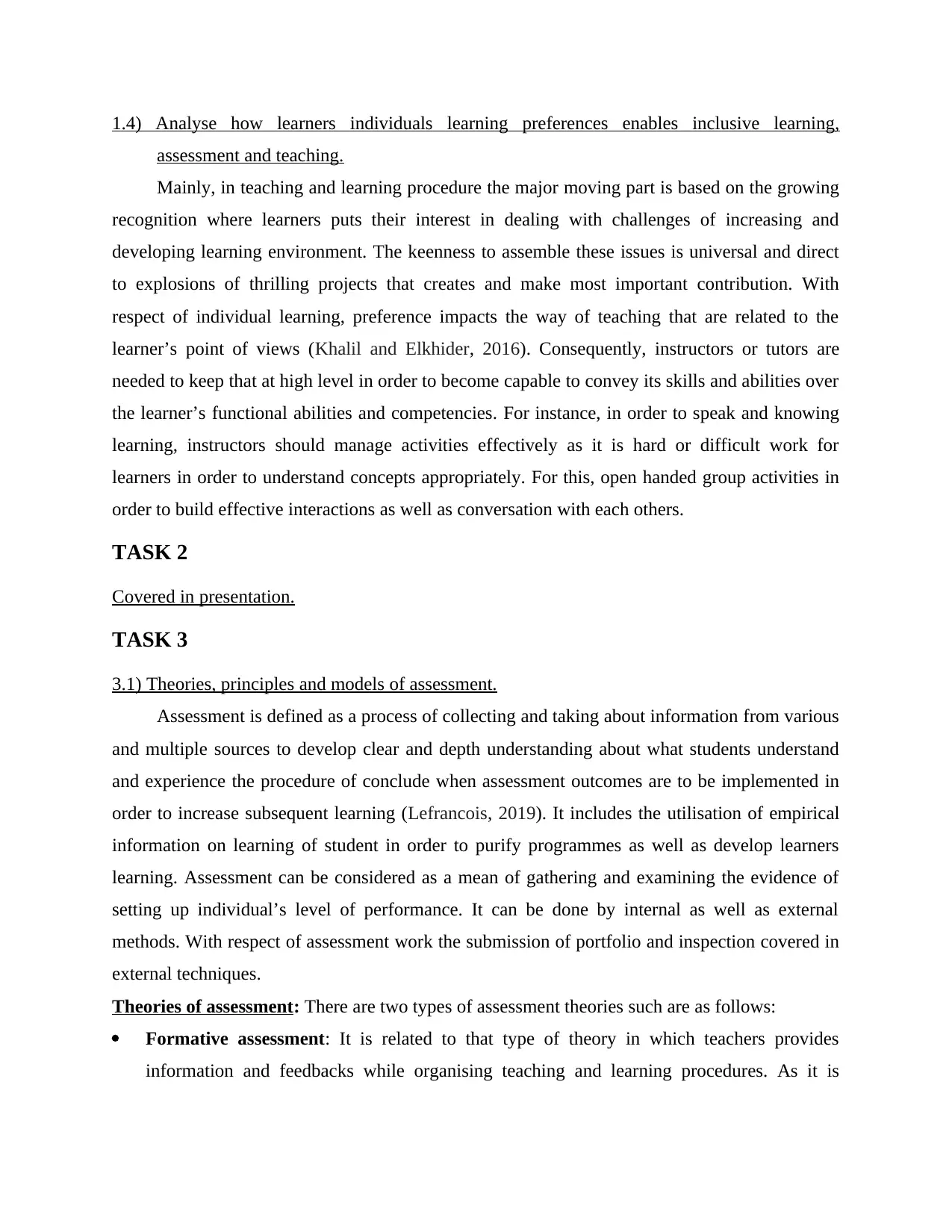
1.4) Analyse how learners individuals learning preferences enables inclusive learning,
assessment and teaching.
Mainly, in teaching and learning procedure the major moving part is based on the growing
recognition where learners puts their interest in dealing with challenges of increasing and
developing learning environment. The keenness to assemble these issues is universal and direct
to explosions of thrilling projects that creates and make most important contribution. With
respect of individual learning, preference impacts the way of teaching that are related to the
learner’s point of views (Khalil and Elkhider, 2016). Consequently, instructors or tutors are
needed to keep that at high level in order to become capable to convey its skills and abilities over
the learner’s functional abilities and competencies. For instance, in order to speak and knowing
learning, instructors should manage activities effectively as it is hard or difficult work for
learners in order to understand concepts appropriately. For this, open handed group activities in
order to build effective interactions as well as conversation with each others.
TASK 2
Covered in presentation.
TASK 3
3.1) Theories, principles and models of assessment.
Assessment is defined as a process of collecting and taking about information from various
and multiple sources to develop clear and depth understanding about what students understand
and experience the procedure of conclude when assessment outcomes are to be implemented in
order to increase subsequent learning (Lefrancois, 2019). It includes the utilisation of empirical
information on learning of student in order to purify programmes as well as develop learners
learning. Assessment can be considered as a mean of gathering and examining the evidence of
setting up individual’s level of performance. It can be done by internal as well as external
methods. With respect of assessment work the submission of portfolio and inspection covered in
external techniques.
Theories of assessment: There are two types of assessment theories such are as follows:
Formative assessment: It is related to that type of theory in which teachers provides
information and feedbacks while organising teaching and learning procedures. As it is
assessment and teaching.
Mainly, in teaching and learning procedure the major moving part is based on the growing
recognition where learners puts their interest in dealing with challenges of increasing and
developing learning environment. The keenness to assemble these issues is universal and direct
to explosions of thrilling projects that creates and make most important contribution. With
respect of individual learning, preference impacts the way of teaching that are related to the
learner’s point of views (Khalil and Elkhider, 2016). Consequently, instructors or tutors are
needed to keep that at high level in order to become capable to convey its skills and abilities over
the learner’s functional abilities and competencies. For instance, in order to speak and knowing
learning, instructors should manage activities effectively as it is hard or difficult work for
learners in order to understand concepts appropriately. For this, open handed group activities in
order to build effective interactions as well as conversation with each others.
TASK 2
Covered in presentation.
TASK 3
3.1) Theories, principles and models of assessment.
Assessment is defined as a process of collecting and taking about information from various
and multiple sources to develop clear and depth understanding about what students understand
and experience the procedure of conclude when assessment outcomes are to be implemented in
order to increase subsequent learning (Lefrancois, 2019). It includes the utilisation of empirical
information on learning of student in order to purify programmes as well as develop learners
learning. Assessment can be considered as a mean of gathering and examining the evidence of
setting up individual’s level of performance. It can be done by internal as well as external
methods. With respect of assessment work the submission of portfolio and inspection covered in
external techniques.
Theories of assessment: There are two types of assessment theories such are as follows:
Formative assessment: It is related to that type of theory in which teachers provides
information and feedbacks while organising teaching and learning procedures. As it is
Paraphrase This Document
Need a fresh take? Get an instant paraphrase of this document with our AI Paraphraser
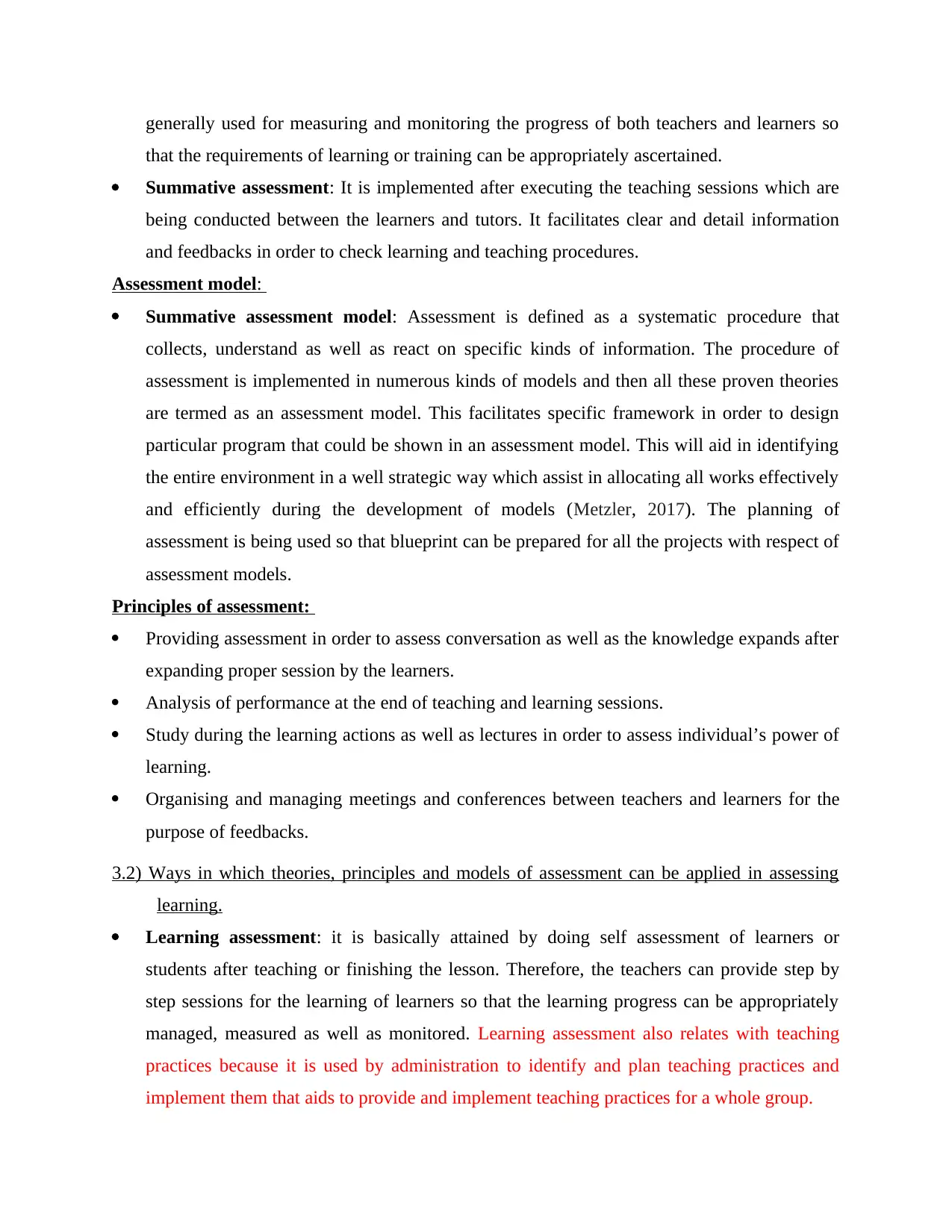
generally used for measuring and monitoring the progress of both teachers and learners so
that the requirements of learning or training can be appropriately ascertained.
Summative assessment: It is implemented after executing the teaching sessions which are
being conducted between the learners and tutors. It facilitates clear and detail information
and feedbacks in order to check learning and teaching procedures.
Assessment model:
Summative assessment model: Assessment is defined as a systematic procedure that
collects, understand as well as react on specific kinds of information. The procedure of
assessment is implemented in numerous kinds of models and then all these proven theories
are termed as an assessment model. This facilitates specific framework in order to design
particular program that could be shown in an assessment model. This will aid in identifying
the entire environment in a well strategic way which assist in allocating all works effectively
and efficiently during the development of models (Metzler, 2017). The planning of
assessment is being used so that blueprint can be prepared for all the projects with respect of
assessment models.
Principles of assessment:
Providing assessment in order to assess conversation as well as the knowledge expands after
expanding proper session by the learners.
Analysis of performance at the end of teaching and learning sessions.
Study during the learning actions as well as lectures in order to assess individual’s power of
learning.
Organising and managing meetings and conferences between teachers and learners for the
purpose of feedbacks.
3.2) Ways in which theories, principles and models of assessment can be applied in assessing
learning.
Learning assessment: it is basically attained by doing self assessment of learners or
students after teaching or finishing the lesson. Therefore, the teachers can provide step by
step sessions for the learning of learners so that the learning progress can be appropriately
managed, measured as well as monitored. Learning assessment also relates with teaching
practices because it is used by administration to identify and plan teaching practices and
implement them that aids to provide and implement teaching practices for a whole group.
that the requirements of learning or training can be appropriately ascertained.
Summative assessment: It is implemented after executing the teaching sessions which are
being conducted between the learners and tutors. It facilitates clear and detail information
and feedbacks in order to check learning and teaching procedures.
Assessment model:
Summative assessment model: Assessment is defined as a systematic procedure that
collects, understand as well as react on specific kinds of information. The procedure of
assessment is implemented in numerous kinds of models and then all these proven theories
are termed as an assessment model. This facilitates specific framework in order to design
particular program that could be shown in an assessment model. This will aid in identifying
the entire environment in a well strategic way which assist in allocating all works effectively
and efficiently during the development of models (Metzler, 2017). The planning of
assessment is being used so that blueprint can be prepared for all the projects with respect of
assessment models.
Principles of assessment:
Providing assessment in order to assess conversation as well as the knowledge expands after
expanding proper session by the learners.
Analysis of performance at the end of teaching and learning sessions.
Study during the learning actions as well as lectures in order to assess individual’s power of
learning.
Organising and managing meetings and conferences between teachers and learners for the
purpose of feedbacks.
3.2) Ways in which theories, principles and models of assessment can be applied in assessing
learning.
Learning assessment: it is basically attained by doing self assessment of learners or
students after teaching or finishing the lesson. Therefore, the teachers can provide step by
step sessions for the learning of learners so that the learning progress can be appropriately
managed, measured as well as monitored. Learning assessment also relates with teaching
practices because it is used by administration to identify and plan teaching practices and
implement them that aids to provide and implement teaching practices for a whole group.
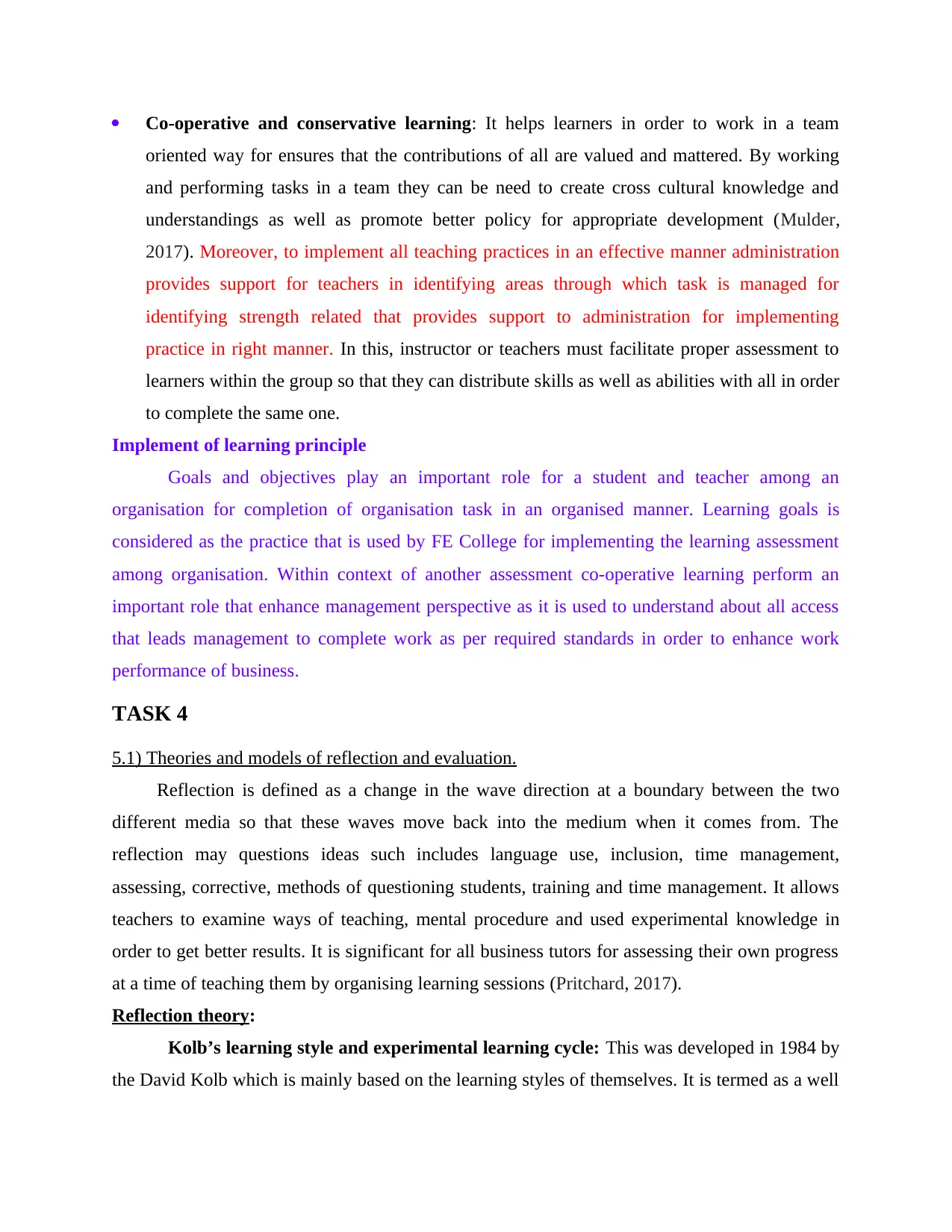
Co-operative and conservative learning: It helps learners in order to work in a team
oriented way for ensures that the contributions of all are valued and mattered. By working
and performing tasks in a team they can be need to create cross cultural knowledge and
understandings as well as promote better policy for appropriate development (Mulder,
2017). Moreover, to implement all teaching practices in an effective manner administration
provides support for teachers in identifying areas through which task is managed for
identifying strength related that provides support to administration for implementing
practice in right manner. In this, instructor or teachers must facilitate proper assessment to
learners within the group so that they can distribute skills as well as abilities with all in order
to complete the same one.
Implement of learning principle
Goals and objectives play an important role for a student and teacher among an
organisation for completion of organisation task in an organised manner. Learning goals is
considered as the practice that is used by FE College for implementing the learning assessment
among organisation. Within context of another assessment co-operative learning perform an
important role that enhance management perspective as it is used to understand about all access
that leads management to complete work as per required standards in order to enhance work
performance of business.
TASK 4
5.1) Theories and models of reflection and evaluation.
Reflection is defined as a change in the wave direction at a boundary between the two
different media so that these waves move back into the medium when it comes from. The
reflection may questions ideas such includes language use, inclusion, time management,
assessing, corrective, methods of questioning students, training and time management. It allows
teachers to examine ways of teaching, mental procedure and used experimental knowledge in
order to get better results. It is significant for all business tutors for assessing their own progress
at a time of teaching them by organising learning sessions (Pritchard, 2017).
Reflection theory:
Kolb’s learning style and experimental learning cycle: This was developed in 1984 by
the David Kolb which is mainly based on the learning styles of themselves. It is termed as a well
oriented way for ensures that the contributions of all are valued and mattered. By working
and performing tasks in a team they can be need to create cross cultural knowledge and
understandings as well as promote better policy for appropriate development (Mulder,
2017). Moreover, to implement all teaching practices in an effective manner administration
provides support for teachers in identifying areas through which task is managed for
identifying strength related that provides support to administration for implementing
practice in right manner. In this, instructor or teachers must facilitate proper assessment to
learners within the group so that they can distribute skills as well as abilities with all in order
to complete the same one.
Implement of learning principle
Goals and objectives play an important role for a student and teacher among an
organisation for completion of organisation task in an organised manner. Learning goals is
considered as the practice that is used by FE College for implementing the learning assessment
among organisation. Within context of another assessment co-operative learning perform an
important role that enhance management perspective as it is used to understand about all access
that leads management to complete work as per required standards in order to enhance work
performance of business.
TASK 4
5.1) Theories and models of reflection and evaluation.
Reflection is defined as a change in the wave direction at a boundary between the two
different media so that these waves move back into the medium when it comes from. The
reflection may questions ideas such includes language use, inclusion, time management,
assessing, corrective, methods of questioning students, training and time management. It allows
teachers to examine ways of teaching, mental procedure and used experimental knowledge in
order to get better results. It is significant for all business tutors for assessing their own progress
at a time of teaching them by organising learning sessions (Pritchard, 2017).
Reflection theory:
Kolb’s learning style and experimental learning cycle: This was developed in 1984 by
the David Kolb which is mainly based on the learning styles of themselves. It is termed as a well
⊘ This is a preview!⊘
Do you want full access?
Subscribe today to unlock all pages.

Trusted by 1+ million students worldwide
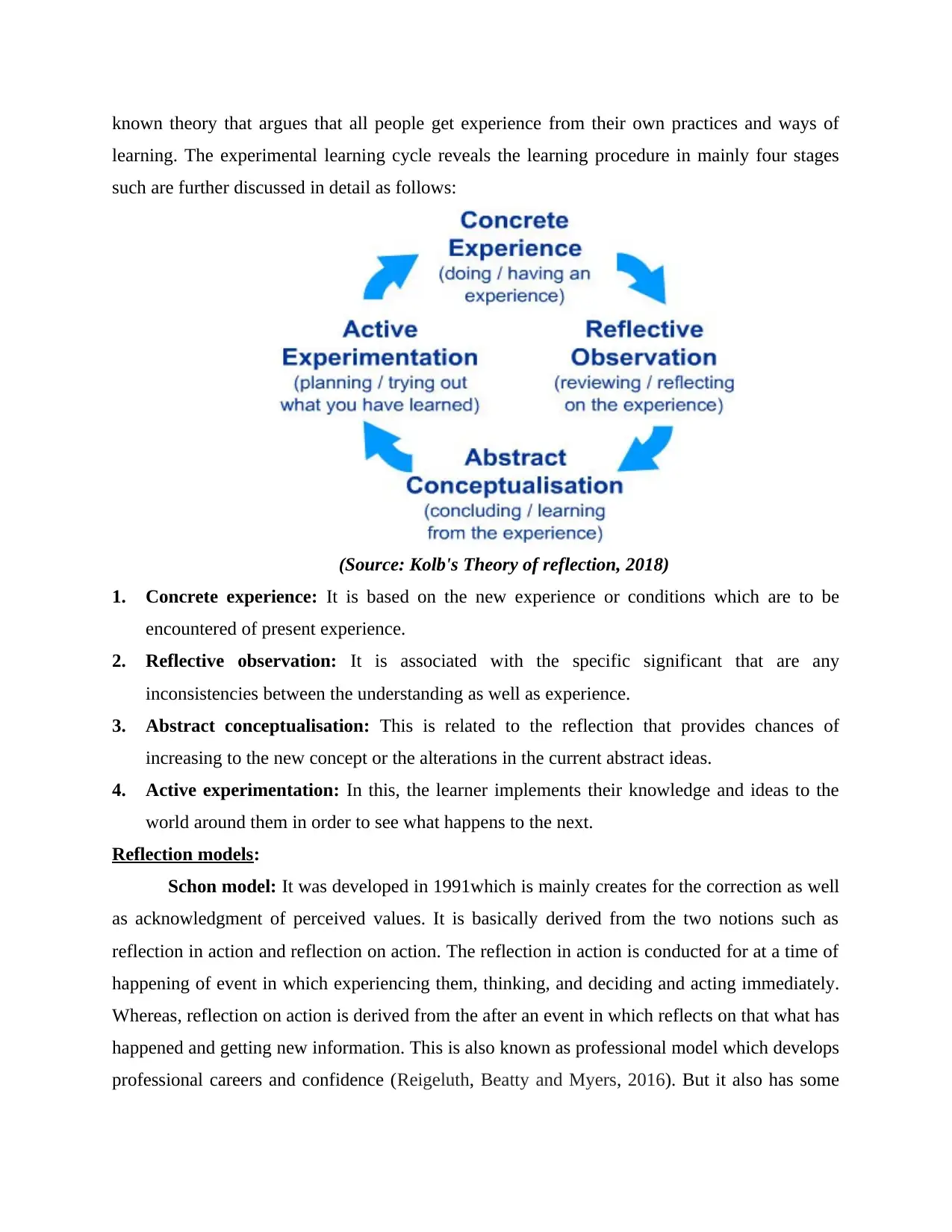
known theory that argues that all people get experience from their own practices and ways of
learning. The experimental learning cycle reveals the learning procedure in mainly four stages
such are further discussed in detail as follows:
(Source: Kolb's Theory of reflection, 2018)
1. Concrete experience: It is based on the new experience or conditions which are to be
encountered of present experience.
2. Reflective observation: It is associated with the specific significant that are any
inconsistencies between the understanding as well as experience.
3. Abstract conceptualisation: This is related to the reflection that provides chances of
increasing to the new concept or the alterations in the current abstract ideas.
4. Active experimentation: In this, the learner implements their knowledge and ideas to the
world around them in order to see what happens to the next.
Reflection models:
Schon model: It was developed in 1991which is mainly creates for the correction as well
as acknowledgment of perceived values. It is basically derived from the two notions such as
reflection in action and reflection on action. The reflection in action is conducted for at a time of
happening of event in which experiencing them, thinking, and deciding and acting immediately.
Whereas, reflection on action is derived from the after an event in which reflects on that what has
happened and getting new information. This is also known as professional model which develops
professional careers and confidence (Reigeluth, Beatty and Myers, 2016). But it also has some
learning. The experimental learning cycle reveals the learning procedure in mainly four stages
such are further discussed in detail as follows:
(Source: Kolb's Theory of reflection, 2018)
1. Concrete experience: It is based on the new experience or conditions which are to be
encountered of present experience.
2. Reflective observation: It is associated with the specific significant that are any
inconsistencies between the understanding as well as experience.
3. Abstract conceptualisation: This is related to the reflection that provides chances of
increasing to the new concept or the alterations in the current abstract ideas.
4. Active experimentation: In this, the learner implements their knowledge and ideas to the
world around them in order to see what happens to the next.
Reflection models:
Schon model: It was developed in 1991which is mainly creates for the correction as well
as acknowledgment of perceived values. It is basically derived from the two notions such as
reflection in action and reflection on action. The reflection in action is conducted for at a time of
happening of event in which experiencing them, thinking, and deciding and acting immediately.
Whereas, reflection on action is derived from the after an event in which reflects on that what has
happened and getting new information. This is also known as professional model which develops
professional careers and confidence (Reigeluth, Beatty and Myers, 2016). But it also has some
Paraphrase This Document
Need a fresh take? Get an instant paraphrase of this document with our AI Paraphraser
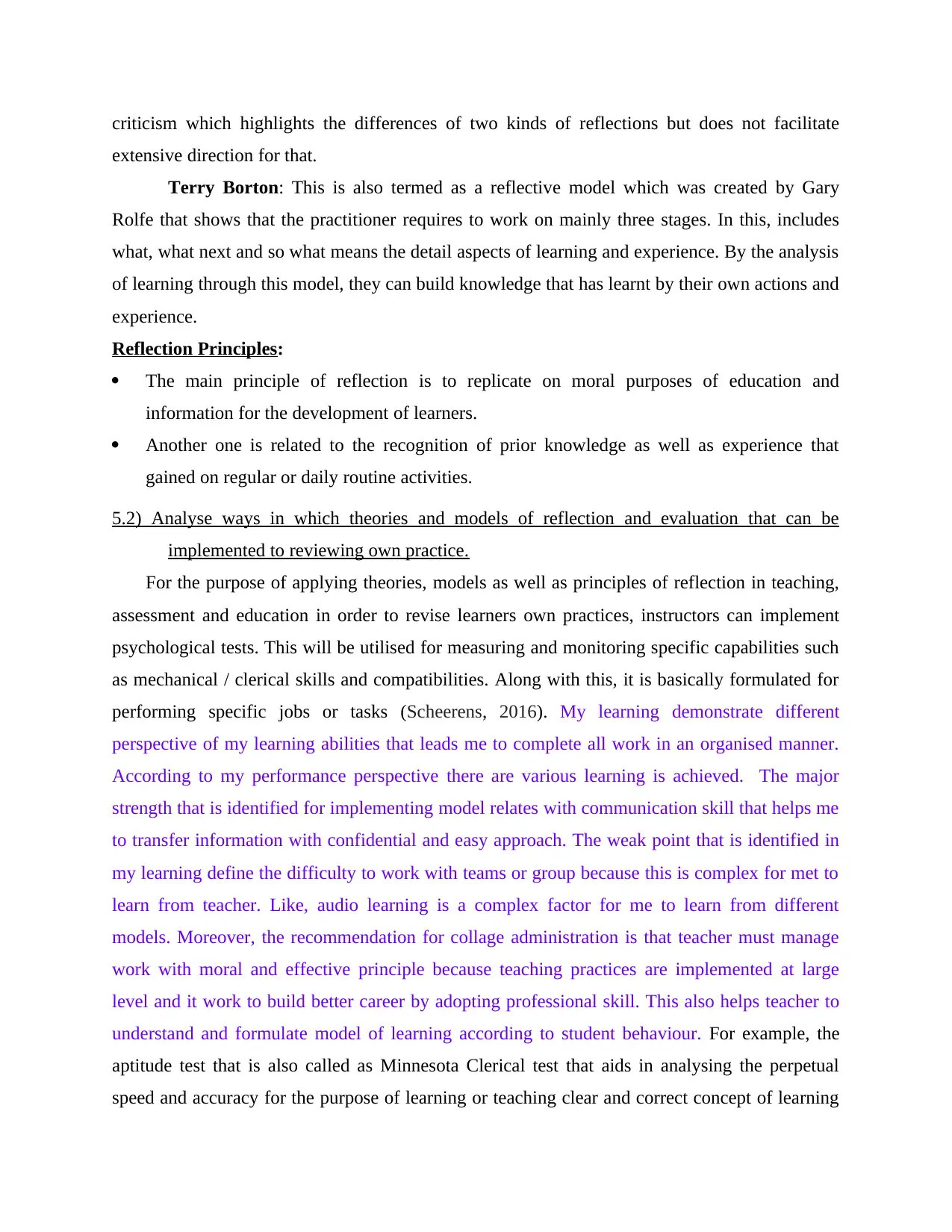
criticism which highlights the differences of two kinds of reflections but does not facilitate
extensive direction for that.
Terry Borton: This is also termed as a reflective model which was created by Gary
Rolfe that shows that the practitioner requires to work on mainly three stages. In this, includes
what, what next and so what means the detail aspects of learning and experience. By the analysis
of learning through this model, they can build knowledge that has learnt by their own actions and
experience.
Reflection Principles:
The main principle of reflection is to replicate on moral purposes of education and
information for the development of learners.
Another one is related to the recognition of prior knowledge as well as experience that
gained on regular or daily routine activities.
5.2) Analyse ways in which theories and models of reflection and evaluation that can be
implemented to reviewing own practice.
For the purpose of applying theories, models as well as principles of reflection in teaching,
assessment and education in order to revise learners own practices, instructors can implement
psychological tests. This will be utilised for measuring and monitoring specific capabilities such
as mechanical / clerical skills and compatibilities. Along with this, it is basically formulated for
performing specific jobs or tasks (Scheerens, 2016). My learning demonstrate different
perspective of my learning abilities that leads me to complete all work in an organised manner.
According to my performance perspective there are various learning is achieved. The major
strength that is identified for implementing model relates with communication skill that helps me
to transfer information with confidential and easy approach. The weak point that is identified in
my learning define the difficulty to work with teams or group because this is complex for met to
learn from teacher. Like, audio learning is a complex factor for me to learn from different
models. Moreover, the recommendation for collage administration is that teacher must manage
work with moral and effective principle because teaching practices are implemented at large
level and it work to build better career by adopting professional skill. This also helps teacher to
understand and formulate model of learning according to student behaviour. For example, the
aptitude test that is also called as Minnesota Clerical test that aids in analysing the perpetual
speed and accuracy for the purpose of learning or teaching clear and correct concept of learning
extensive direction for that.
Terry Borton: This is also termed as a reflective model which was created by Gary
Rolfe that shows that the practitioner requires to work on mainly three stages. In this, includes
what, what next and so what means the detail aspects of learning and experience. By the analysis
of learning through this model, they can build knowledge that has learnt by their own actions and
experience.
Reflection Principles:
The main principle of reflection is to replicate on moral purposes of education and
information for the development of learners.
Another one is related to the recognition of prior knowledge as well as experience that
gained on regular or daily routine activities.
5.2) Analyse ways in which theories and models of reflection and evaluation that can be
implemented to reviewing own practice.
For the purpose of applying theories, models as well as principles of reflection in teaching,
assessment and education in order to revise learners own practices, instructors can implement
psychological tests. This will be utilised for measuring and monitoring specific capabilities such
as mechanical / clerical skills and compatibilities. Along with this, it is basically formulated for
performing specific jobs or tasks (Scheerens, 2016). My learning demonstrate different
perspective of my learning abilities that leads me to complete all work in an organised manner.
According to my performance perspective there are various learning is achieved. The major
strength that is identified for implementing model relates with communication skill that helps me
to transfer information with confidential and easy approach. The weak point that is identified in
my learning define the difficulty to work with teams or group because this is complex for met to
learn from teacher. Like, audio learning is a complex factor for me to learn from different
models. Moreover, the recommendation for collage administration is that teacher must manage
work with moral and effective principle because teaching practices are implemented at large
level and it work to build better career by adopting professional skill. This also helps teacher to
understand and formulate model of learning according to student behaviour. For example, the
aptitude test that is also called as Minnesota Clerical test that aids in analysing the perpetual
speed and accuracy for the purpose of learning or teaching clear and correct concept of learning
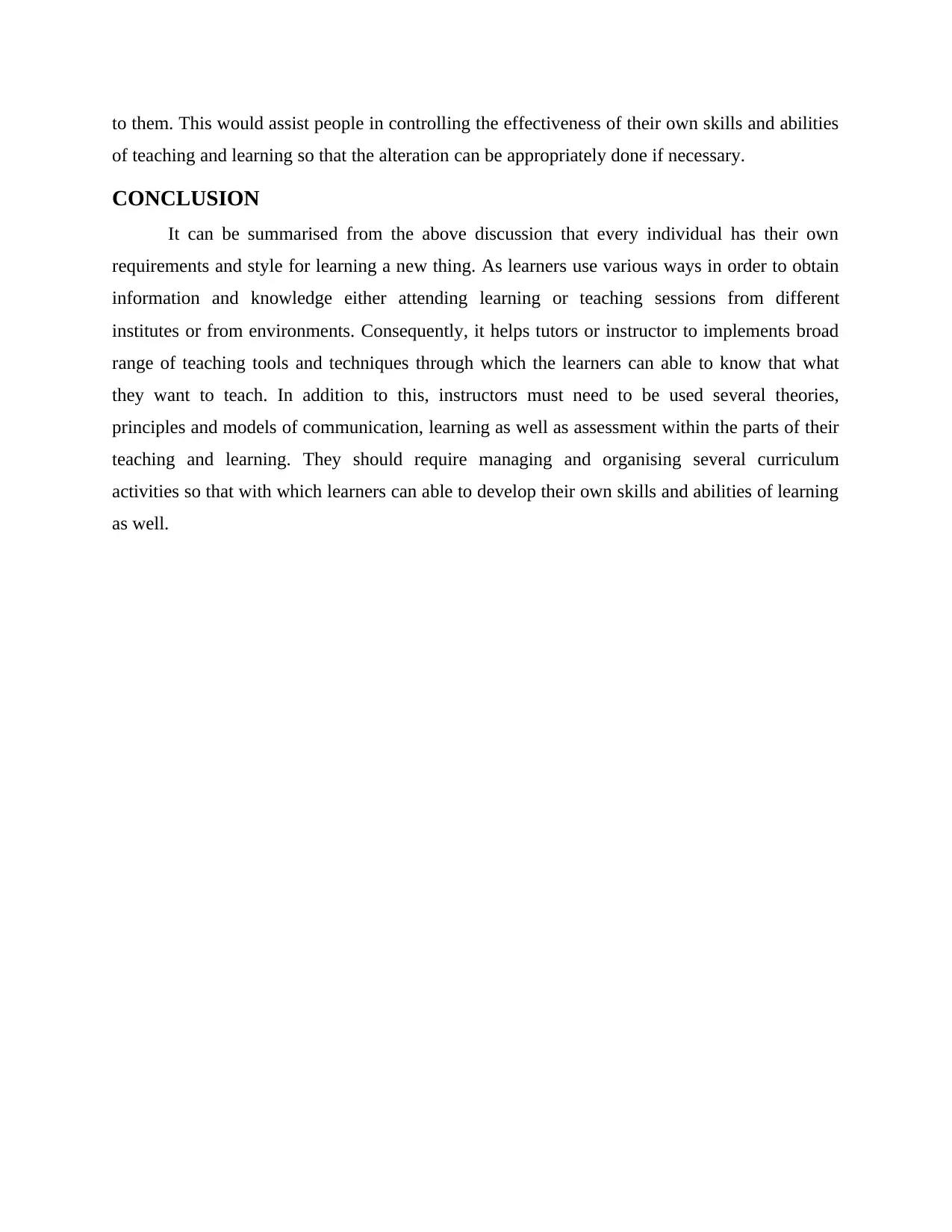
to them. This would assist people in controlling the effectiveness of their own skills and abilities
of teaching and learning so that the alteration can be appropriately done if necessary.
CONCLUSION
It can be summarised from the above discussion that every individual has their own
requirements and style for learning a new thing. As learners use various ways in order to obtain
information and knowledge either attending learning or teaching sessions from different
institutes or from environments. Consequently, it helps tutors or instructor to implements broad
range of teaching tools and techniques through which the learners can able to know that what
they want to teach. In addition to this, instructors must need to be used several theories,
principles and models of communication, learning as well as assessment within the parts of their
teaching and learning. They should require managing and organising several curriculum
activities so that with which learners can able to develop their own skills and abilities of learning
as well.
of teaching and learning so that the alteration can be appropriately done if necessary.
CONCLUSION
It can be summarised from the above discussion that every individual has their own
requirements and style for learning a new thing. As learners use various ways in order to obtain
information and knowledge either attending learning or teaching sessions from different
institutes or from environments. Consequently, it helps tutors or instructor to implements broad
range of teaching tools and techniques through which the learners can able to know that what
they want to teach. In addition to this, instructors must need to be used several theories,
principles and models of communication, learning as well as assessment within the parts of their
teaching and learning. They should require managing and organising several curriculum
activities so that with which learners can able to develop their own skills and abilities of learning
as well.
⊘ This is a preview!⊘
Do you want full access?
Subscribe today to unlock all pages.

Trusted by 1+ million students worldwide
1 out of 13
Related Documents
Your All-in-One AI-Powered Toolkit for Academic Success.
+13062052269
info@desklib.com
Available 24*7 on WhatsApp / Email
![[object Object]](/_next/static/media/star-bottom.7253800d.svg)
Unlock your academic potential
Copyright © 2020–2026 A2Z Services. All Rights Reserved. Developed and managed by ZUCOL.



